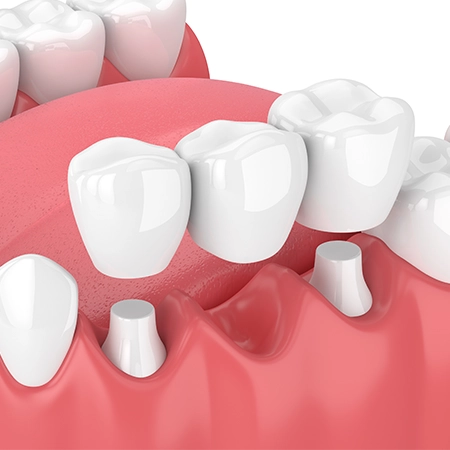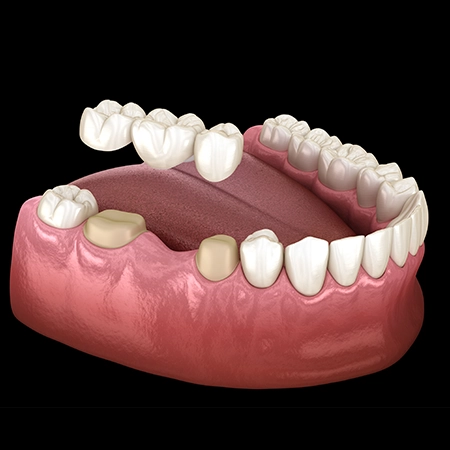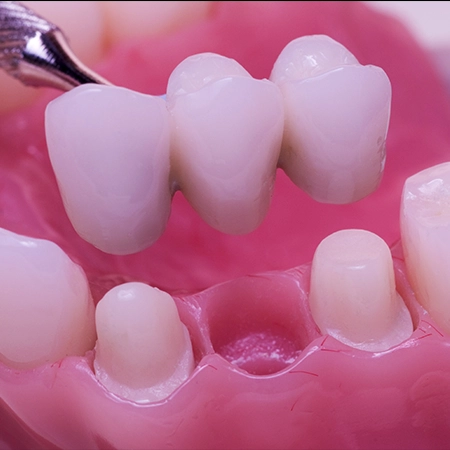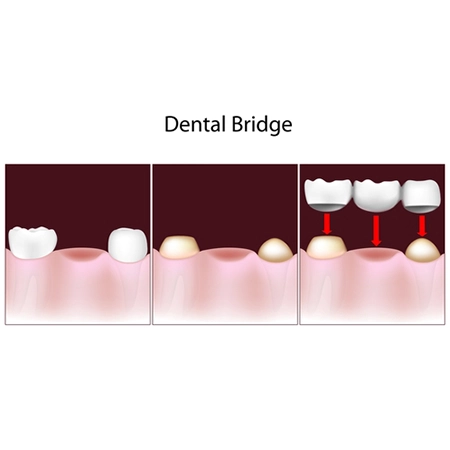Dental Bridges In Aurora, IL
Dental Bridges
Missing teeth is more than just an aesthetic issue- it can also cause some functional problems as well. When you are missing teeth, it is almost impossible to eat certain foods, and speaking is difficult.
Therefore, if you are missing teeth, you may want to consider your replacement options before the problem escalates. City of Lights Dental in Aurora, IL offers several options for replacing missing teeth including dental bridges.
Here’s what you need to know about dental bridges.


Why Choose City of Lights Dental For Dental Bridges?
The dentists at City of Lights Dental have been extensively trained in a variety of dental procedures, including dental bridges. We strive to create a comfortable environment to help relieve any anxieties you may have. We will help you understand your procedures as well. We believe that a patient’s comfort and knowledge are a major part of their treatment at City of Lights Dental.
What are Dental Bridges?
A dental bridge is a permanent oral appliance designed to replace one or more missing teeth as an alternative to a partial denture. There are several different types of dental bridges based on the number and location of the missing teeth. They can be made of different materials, which contributes to the differing costs.
Types of Dental Bridges at City of Lights Dental
There are four main types of dental bridges offered at City of Lights Dental:
Traditional Fixed Dental Bridge
This is the most common type of dental bridge, consisting of a crown on each side with artificial teeth between.

Maryland Dental Bridge
A Maryland bridge, also known as a resin-bonded bridge, is typically used to replace missing front teeth. This type of crown is attached to the adjacent teeth with wings instead of crowns.
Implant-supported Dental Bridge
An implant-supported bridge is attached to dental implants on each side of the gap instead of the natural teeth. Due to the implant placement, this type of bridge may take longer to install.
Cantilever Dental Bridge
A cantilever dental bridge is used when there is only one natural tooth to anchor to but these are rarely used. Typically, in this case, dental implants will be recommended.
Benefits of Dental Bridges
Dental bridges have several benefits/advantages over other tooth replacement options, including:
- Creates a more natural, aesthetically pleasing appearance
- Restores ability to speak clearly/improves enunciation
- Prevents jawbone deterioration near missing teeth, which helps maintain normal facial structure
- Restores ability to chew food
- Prevents neighboring teeth from shifting into the space

Who is the Ideal Candidate for Dental Bridges?
If you are considering getting a dental bridge, it is important to note that not everyone qualifies for this treatment. Like most of the other treatments at City of Lights Dental, candidacy for this treatment is determined on a case-by-case basis. Therefore, you will need to schedule a consultation to determine if this treatment is right for you. Still, there are some general criteria used:
- Missing at least one permanent tooth
- No major health concerns or infections
- Healthy teeth and good jawbone structure- little to no jawbone deterioration
- Good oral health
- Able to perform proper oral hygiene to maintain the dental bridge
Dental Bridges Procedure
The procedure for dental bridges depends on the type of bridge you are getting. Most of the time, you will need at least two appointments, sometimes more. The process for getting a dental bridge can be quite extensive. One of the primary things the procedures have in common is that the dentist will need to take an impression or digital scan of your teeth for the lab to use in the fabrication process.
1. Traditional/Cantilever Dental Bridge
The very first step in getting a traditional or cantilever bridge is to prepare the neighboring teeth. The dentist will administer local anesthesia and, once it has taken effect, will begin to scrape away some of the enamel and dentin to create space for the dental crown to be placed. Typically, a temporary bridge will be placed to protect the teeth until your permanent bridge is ready.
Once your permanent bridge is ready, the temporary bridge will be removed, and the teeth cleaned thoroughly. Then, the dentist will check the fit of the permanent crown to ensure a proper fit before cementing it in place.
In some cases, the bridge will be permanently cemented in place at this time. However, many times temporary cement will be used to allow you time to get used to the bridge and be sure that it fits properly before permanently cementing it in place.
2. Maryland Dental Bridge
The only preparation of neighboring teeth required for a Maryland dental bridge is some minor etching on the back. This will allow the wings to bond to it. After testing the bridge to ensure a proper fit, the dentist will place the bridge and cement it to the neighboring teeth with a strong resin.
3. Implant-Supported Dental Bridge
An implant-supported dental bridge typically takes longer than the other types of bridges because an additional step is required. Dental implants must be placed on each side of the gap, which will be followed by a period of recovery. Recovery from dental implant placement depends on several factors including the location of the implants, the health of your jawbone, and whether you need bone grafting to build up the jawbone.
Typically, the dentist will place a temporary dental bridge for you to wear while you are healing.
4. Post-Procedure Care
Proper oral hygiene habits are critical when you have a dental bridge to ensure that the remaining natural teeth remain strong and healthy. Plus, taking proper care of your teeth can make the dental bridge last longer.
Therefore, it’s important to brush and floss at least twice a day. If you need help, our dental team will be happy to show you the proper way to clean around your dental bridge. In addition, the American Dental Association recommends that you visit your dentist every 6 months for an exam and dental cleaning.
Finally, you’ll need to give up certain foods that could damage the bridge, including those that are sticky, hard, and/or sugary. You may also need to give up popcorn and nuts, as they are known to get stuck under the bridge.
How Much Does Dental Bridges Cost In Aurora, IL?
The cost of a dental bridge depends on several factors including the number of teeth needed, the location of the bridge, the type of bridge you need, and a few others. On average, bridge dentures cost between $1,500 to $16,000.
However, most dental insurance providers will cover a portion of this treatment. If you do not have dental insurance or if your dental insurance does not cover any part of this treatment, we will be happy to explain our financing options. This will allow you to break the fee up into easy-to-manage, budget-friendly payments.

Do You Need a Dental Bridge? Schedule Your Consultation Today
If you are missing one or more teeth in a row, you may want to consider a dental bridge as a replacement option. A dental bridge is more affordable than replacing each tooth with a single dental implant. Schedule your consultation with the team at City of Lights Dental in Aurora, IL today to learn more about dental bridges.
FAQs on Dental Bridges
If you ever have any questions or concerns about dental bridges or other restorative procedures at City of Lights Dental, our team will be happy to help. Our dentists have been extensively trained in a variety of procedures and believe that getting the right information is the first step in the treatment process.
How much does a bridge cost for your teeth?
The cost of a dental bridge ranges from around $1,500 to $16,000 depending on the type of bridge you get, the number of teeth on the bridge, and the material that the teeth are made of.
What is the cheapest type of dental bridge?
Removable dental bridges are the cheapest, ranging from around $300 to $2.500.
What is the downside of a dental bridge?
While there are many benefits/advantages of dental bridges, there are also a few downsides/disadvantages, including:
- Difficult to clean compared to single-tooth dental implants
- Neighboring teeth must be altered to create space for the bridge to sit on the teeth
- Dental bridge costs can be high
- Higher risk of complications: supporting teeth may need root canal treatment, jawbone deterioration, broken restoration, and tooth decay in the supporting teeth. If the bridge fails, it will need to be replaced, which contributes to the high cost of dental bridges
- Lifelong commitment requiring ongoing maintenance and replacement

